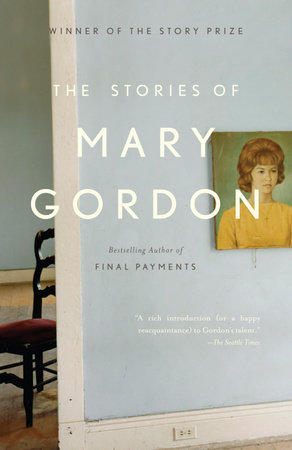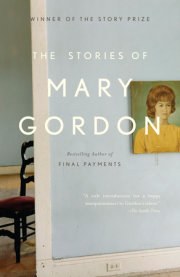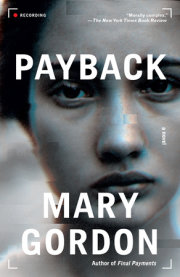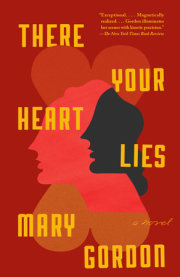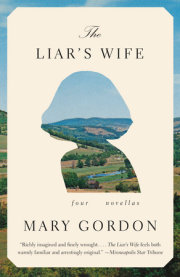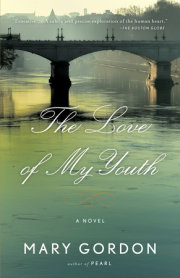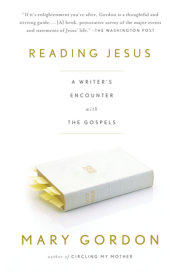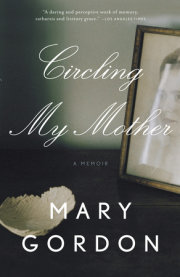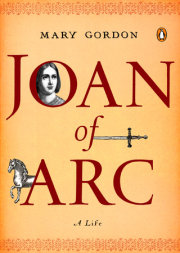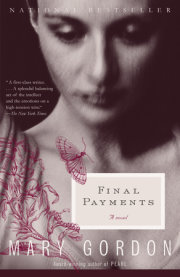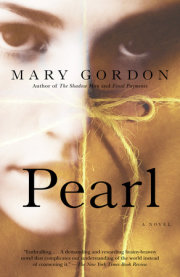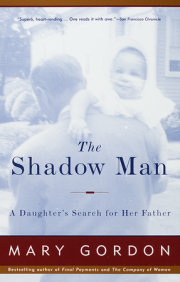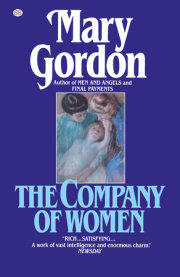City Life
Peter had always been more than thoughtful in not pressing her about her past, and Beatrice was sure it was a reason for her choice of him. Most men, coming of age in a time that extolled openness and disclosure, would have thought themselves remiss in questioning her so little. Perhaps because he was a New Englander–one of four sons in a family that had been stable for generations–perhaps because he was a mathematician, perhaps because both the sight of her and her way of living had pleased him from the first and continued to please him, he had been satisfied with what she was willing to tell. “My parents are dead. We lived in western New York State, near Rochester. I am an only child. I have no family left.”
She preferred saying “I have no family left”–creating with her words an absence, a darkness, rather than to say what had been there, what she had ruthlessly left, with a ruthlessness that would have shocked anyone who knew her later. She had left them so thoroughly that she really didn’t know if they were still living. When she tried to locate them, with her marriage and her children and the warm weight of her domestic safety at her back, there was no trace of them. It had shocked and frightened her how completely they had failed to leave a trace. This was the sort of thing most people didn’t think of: how possible it was for people like her parents to impress themselves so little on the surface, the many surfaces of the world, that they would leave it or inhabit it with the same lack of a mark.
They were horrors, her parents, the sort people wanted to avert their eyes from, that people felt it was healthful to avert their eyes from. They had let their lives slip very far, further than anyone Beatrice now knew could even begin to imagine. But it had always been like that: a slippage so continuous that there was simultaneously a sense of slippage and of already having slipped.
It was terribly clear to her. She was brought up in filth. Most people, Beatrice knew, believed that filth was temporary, one of those things, unlike disease or insanity or social hatred–that didn’t root itself in but was an affair of surfaces, therefore dislodgeable by effort, will, and the meagerest brand of intelligence. That was, Beatrice knew, because people didn’t understand filth. They mistook its historical ordinariness for simplicity. They didn’t understand the way it could invade and settle, take over, dominate, and for good, until it became, inevitably, the only true thing about a place and the only lives that could be lived there. Dust, grime, the grease of foods, the residues of bodies, the smells that lived in the air, palpable, malign, unidentifiable, impossible to differentiate: an ugly population of refugees from an unknowable location, permanent, stubborn, knife-faced settlers who had right of occupancy–the place was theirs now–and would never leave.
Beatrice’s parents had money for food, and the rent must have been paid to someone. They had always lived in the one house: her mother, her father, and herself. Who could have owned it? Who would have put money down for such a place? One-story, nearly windowless, the outside walls made of soft shingle in the semblance of pinkish gray brick. It must have been built from the first entirely without love, with the most cynical understanding, Beatrice had always thought, of the human need for shelter and the dollar value that it could bring. Everything was cheap and thin, done with the minimum of expense and of attention. No thought was given to ornament or amplitude, or even to the long, practical run: what wouldn’t age horribly or crumble, splinter, quickly fade.
As she grew older, she believed the house had been built to hide some sort of criminality. It was in the middle of the woods, down a dirt road half a mile down Highway 117, which led nowhere she knew, or maybe south, she somehow thought, to Pennsylvania. Her parents said it had once been a hunting lodge, but she didn’t believe it. When she was old enough to have learned about bootlegging, and knew that whiskey had been smuggled in from Canada, she was convinced that the house had had something to do with that. She could always imagine petty gangsters, local thugs in mean felt hats and thin-soled shoes trading liquor for money, throwing their cigarette butts down on the hard, infertile ground, then driving away from the house, not giving it a thought until it was time for their next deal.
Sometimes she thought it was the long periods of uninhabitedness that gave the house its closed, and vengeful, character. But when she began to think like that, it wasn’t long before she understood that kind of thought to be fantastical. It wasn’t the house, houses had no will or nature. Her parents had natures, and it was their lives and the way they lived that made their dwelling a monstrosity.
She had awakened each day in dread, afraid to open her eyes, knowing the first thing they fell on would be ugly. She didn’t even know where she could get something for herself that might be beautiful. The word couldn’t have formed itself in her mind in any way that could attach to an object that was familiar to her, or that she could even imagine having access to. She heard, as if from a great distance, people using the word “beautiful” in relation to things like trees or sunsets, but her faculty for understanding things like this had been so crippled that the attempt to comprehend what people were saying when they spoke like this filled her with a kind of panic. She couldn’t call up even the first step that would allow her, even in the far future, to come close to what they meant. They were talking about things out of doors when they talked about trees and sunsets. And what was the good of that? You could go out of doors. The blueness of the sky, the brightness of the sun, the freshness of a tree would greet you, but in the end you would only have to go back somewhere to sleep. And that would not be beautiful; it would be where you lived. So beauty seemed a dangerous, foreign, and irrelevant idea. She turned for solace, not to it, but to the nature of enclosure. Everything in her life strained toward the ideal of separations: how to keep the horror of her parents’ life from everything that could be called her life.
She learned what it was she wanted from watching her grade school teachers cutting simple shapes–squares, triangles–and writing numbers in straight columns on the blackboard or on paper with crisp, straight blue lines. The whiteness of pages, the unmuddled black of print, struck her as desirable; the dry rasping of the scissors, the click of a stapler, the riffling of a rubber band around a set of children’s tests. She understood all these things as prosperity, and knew that her family was not prosperous; they were poor. But she knew as well that their real affliction wasn’t poverty but something different–you might, perhaps, say worse–but not connected to money. If she could have pointed to that–a simple lack of money–it would have been more hopeful for her. But she knew it wasn’t poverty that was the problem. It was the way her parents were. It was what they did.
They drank. That was what they did. It was, properly speaking, the only thing they did. But no, she always told herself when she began to think that way, it wasn’t the only thing. Her father, after all, had gone out to work. He was a gravedigger in a Catholic cemetery. Each morning he woke in the dark house. Massive, nearly toothless, and still in his underwear, he drank black coffee with a shot in it for breakfast, and then put on his dark olive work pants and shirts, his heavy boots–in winter a fleece-lined coat and cap–and started the reluctant car driving down the dirt road. He came home at night, with a clutch of bottles in a paper bag, to begin drinking. He wasn’t violent or abusive; he was interested only in the stupor he could enter and inhabit. This, Beatrice knew early on, was his true home.
Her mother woke late, her hair in pin curls wrapped in a kerchief, which she rarely bothered to undo. She was skeletally thin; her skin was always in a state of dull eruptions; red spidery veins on her legs always seemed to Beatrice to be the tracks of a slow disease. Just out of bed, she poured herself a drink, not bothering to hide it in coffee, and drank it from a glass that had held cheese spread mixed with pimentos, which her parents ate on crackers when they drank, and which was often Beatrice’s supper. Beatrice’s mother would sit for a while on the plaid couch, watch television, then go back to bed. The house was nearly always silent; there were as few words in the house as there were ornaments. It was another reason Peter liked her. She had a gift, he said, for silence, a gift he respected, that he said too few people had. She wondered if he would have prized this treasure if he’d known its provenance.
Beatrice saw everything her parents did because she slept in the large room. When she was born, her parents had put a crib for her in the corner of the room nearest their bedroom, opposite the wall where the sink, the stove, and the refrigerator were. It didn’t occur to them that she might want privacy; when she grew taller, they replaced her crib with a bed, but they never imagined she had any more rights or desires than an infant. The torpor, the disorder of their lives, spread into her quarters. For years, it anguished her to see their slippers, their half-read newspapers, broken bobby pins, half-empty glasses, butt-filled ashtrays traveling like bacilli into the area she thought of as hers. When she was ten, she bought some clothesline and some tacks. She bought an Indian bedspread from a hippie store in town; rose-colored, with a print of tigers; the only vivid thing in the place. She made a barrier between herself and them. Her father said something unkind about it, but she took no notice.
For the six years after that, she came home as little as she could, staying in the school library until it closed, walking home miles in the darkness. She sat on her bed, did what was left of her homework, and, as early as possible, lay down to sleep. At sunrise, she would leave the house, walking the roads till something opened in the town–the library, the five-and-ten, the luncheonette–then walking for more hours till sunset. She didn’t love the woods; she didn’t think of them as nature, with all the implications she had read about. But they were someplace she could be until she had no choice but to be there again, but not quite there, not in the place that was theirs, but her place, behind her curtain, where she needn’t see the way they lived.
She moved out of her parents’ house two days after she graduated from high school. She packed her few things and moved to Buffalo, where she got a job in a tool and die factory, took night courses at the community college. She did this for five years, then took all her savings and enrolled in the elementary education program at the University of Buffalo full-time. She’d planned it all out carefully, in her tiny room, living on yogurt she made from powdered milk, allowing it to ferment in a series of thermoses she’d bought at garage sales, eating the good parts of half-rotten fruit and vegetables she’d bought for pennies, the fresh middle parts of loaves of day-old bread. Never, in those years, did she buy a new blouse or skirt or pair of jeans. She got her clothes from the Salvation Army; it was only later, after she married, that she learned to sew.
In her second semester, she met Peter in a very large class: European History 1789—1945. He said he’d fallen in love with several things about her almost at once: the look of her notebooks, the brilliant white of the collar of her shirt as it peeked over the top of her pastel blue Shetland sweater, the sheer pink curves of her fingernails. He said he’d been particularly taken by her thumb. Most women’s thumbs were ugly and betrayed the incompleteness of their femininity, the essential coarseness of it. The fineness of her thumb, the way the nail curved and was placed within the flesh, showed there wasn’t a trace of coarseness in her: everything connected with her was, and would always be, fine. He didn’t find out until they’d dated a few times that she was older, more than three years older than he was. He accepted that she’d had to work those years because her parents had–tragically–died.
Beatrice knew what Peter saw when he looked at her: clarity and simplicity and thrift, an almost holy sign of order, a plain creature without hidden parts or edges, who would sail through life before him making a path through murky seas, leaving to him plain sailing: nothing in the world to obstruct him or the free play of his mind. She knew that he didn’t realize that he had picked her in part for the emptiness of her past, imagining a beautiful blankness, blameless, unpopulated, clear. His pity for her increased her value for him: she was an exile in the ordinary world he was born into, lacking the encumbrances that could make for problems in his life. He believed that life could be simple, that he would leave from a cloudless day and drop into the teeming fog of mathematics, which for him was peopled, creatured, a tumultuous society he had to colonize and civilize and rule.
She knew he felt he could leave all the rest to her, turning to her at night with the anomaly of his ardor, another equation she could elegantly solve. His curiosity about the shape of her desire was as tenderly blunted as his curiosity about her past, and she was as glad of the one as of the other. Making love to him, an occurrence she found surprisingly frequent, she could pretend she was sitting through a violent and fascinating storm that certainly would pass. Having got through it, she could be covered over in grateful tenderness for the life that he made possible: a life of clean linen and bright rooms, of matched dishes and a variety of specialized kitchen items: each unique, for one use only, and not, as everything in her mother’s house was, interchangeable.
So the children came, three boys, and then the farmhouse, bought as a wreck, transformed by Beatrice Talbot into a treasure, something acquaintances came to see as much (more, she thought, if they were honest) as they did the family itself. Then Peter’s tenure, and additions on the house: a sewing room, a greenhouse, then uncovering the old woodwork, searching out antique stores, auctions, flea markets for the right furniture–all this researched in the university library and in the local library–and the children growing and needing care so that by the time Peter came home with the news that was the first breakup of the smooth plane that had been their life together, the children had become, somehow, twelve, ten, and eight.
He had won a really spectacular fellowship at Columbia, three years being paid twice what he made at Cornell and no teaching, and a chance to work beside the man who was tops in his field. Peter asked Beatrice what she thought, but only formally. They both knew. They would be going to New York.
Nights in the house ten miles above Ithaca–it was summer and in her panic she could hear the crickets and, toward dawn, smell the freshness of the wet grass–she lay awake in terror of the packing job ahead of her. Everything, each thing she owned, would have to be wrapped and collected. She lived in dread of losing something, breaking something, for each carefully selected, carefully tended object that she owned was a proof of faith against the dark clutching power of the past. She typed on an index card a brief but wholly accurate description of the house, and the housing office presented her with a couple from Berlin–particle physicists, the both of them, and without children, she was grateful to hear. They seemed clean and thorough; they wanted to live in the country, they were the type who would know enough to act in time if a problem was occurring, who wouldn’t let things get too far.
Peter and Beatrice were assured by everyone they talked to in New York that their apartment was a jewel. Sally Rodier, the wife of Peter’s collaborator, who also helped Beatrice place the children in private schools, kept telling her how incredibly lucky they were, to have been given an apartment in one of the buildings on Riverside Drive. The view could be better, but they had a glimpse of the river. Really, they were almost disgustingly lucky, she said, laughing. Did they know what people would do to get what they had?
But Beatrice’s heart sank at the grayness of the grout between the small octagonal bathroom floor tiles, the uneven job of polyurethaning on the living room floor, the small hole in the floor by the radiator base, the stiff door on one of the kitchen cabinets, the frosted glass on the window near the shower that she couldn’t, whatever she did, make look clean.
For nearly a month she worked, making the small repairs herself, unheard-of behavior, Sally Rodier said, in a Columbia tenant. She poured a lake of bleach on the bathroom floor, left it for six hours, then, sopping it up, found she had created a field of dazzling whiteness. She made curtains; she scraped the edges of the window frames. Then she began to venture out. She had been so few places, had done so little, that the city streets, although they frightened her, began to seem a place of quite exciting possibilities. Because she did her errands, for the first time in her life, on foot, she could have human contact with no fear of revelation. She could be among her kind without fear every second that they would find out about her: where and what she’d come from, who she really was. Each day the super left mail on her threshold; they would exchange a pleasant word or two. He was a compact and competent man who had left his family in Peru. She could imagine that he and the Bangladeshi doormen, and the people on the streets, all possessed a dark and complicated past, things they’d prefer to have hidden as she did. In Buffalo, in Ithaca, people had seemed to be expressing everything they were. Even their reserve seemed legible and therefore relatively simple. But, riding on the bus and walking out on Broadway, she felt for the first time part of the web of concealment, of lives constructed like a house with rooms that gave access only to each other, rooms far from the initial entrance, with no source of natural light.
By Thanksgiving, she was able to tell Peter, who feared that she would suffer separation from her beloved house, that she was enjoying herself very much. The boys, whose lives, apart from their aspects of animal survival, never seemed to have much to do with her, were absorbed in the thick worlds of their schools–activities till five or six most nights, homework, and supper and more homework. Weekends, she could leave them to Peter, who was happy to take them to the park for football, or to the university pool, or the indoor track. She would often go to the Metropolitan Museum, to look at the collection of American furniture or, accompanied by a guidebook, on an architectural tour.
Copyright © 2007 by Mary Gordon. All rights reserved. No part of this excerpt may be reproduced or reprinted without permission in writing from the publisher.

